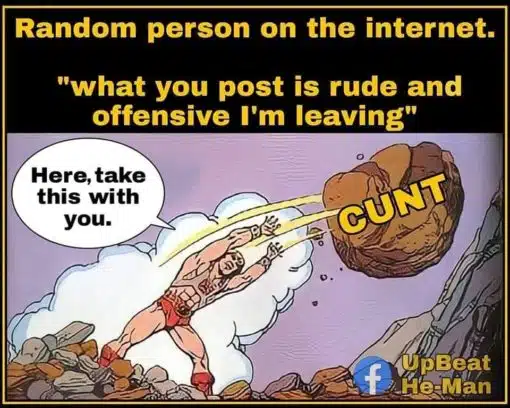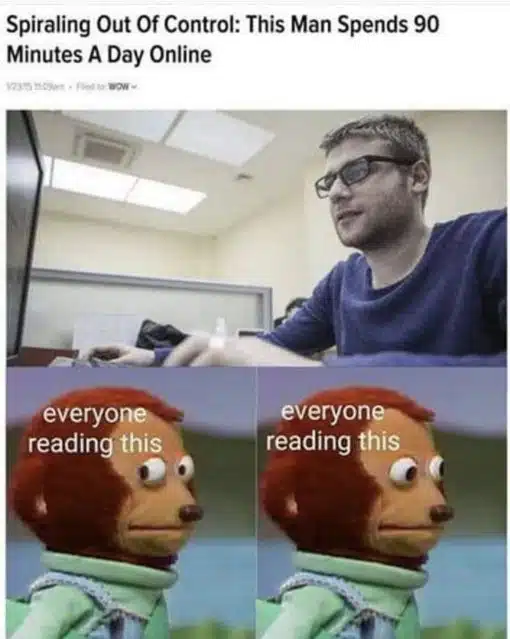Top 50 Internet Memes
RANKING FOR BEST Internet Meme
Hello there! Welcome to the epicenter of digital hilarity on “Internet Memes Ranked,” hosted on the one and only topyoular.com. I’m your virtual guide to this ever-evolving, constantly updating page dedicated to ranking the crème de la crème of internet memes. Here, in my domain, you get to dive deep into the world of internet culture, exploring memes that have tickled ribs, sparked conversations, and sometimes, even shaped the online discourse.
Crafted meticulously for enthusiasts and casual browsers alike, I pride myself on showcasing the top 50 memes in the “Internet” category. This isn’t just any collection; it’s a carefully curated compilation voted on by people like you! You see, at the heart of this page lies an interactive voting system, empowering you to push your favorite memes up the ranks. Whether it’s a timeless classic or a fresh meme that’s just started making the rounds, your vote helps determine who makes it into the esteemed top 50.
I live to entertain and inform. Each meme comes with its own snippet of history, interesting facts, or even the backstory on how it became a pivotal part of internet culture. It’s not just about the laughs here (though, we have plenty of those); it’s about understanding what makes these memes resonate with so many across the globe.
At “Internet Memes Ranked”, you aren’t just browsing memes; you’re becoming part of a community that appreciates the art and impact of internet memes. So, whether you’re here to reminisce about the memes that have defined the online world, looking for a quick laugh, or eager to see which memes are currently ruling the internet, you’ve come to the right place. Remember, this is the definitive rank page for the “Internet” category, showcasing the best of the best—as decided by you, the real connoisseurs of internet culture.
Happy browsing, and may the best meme win!
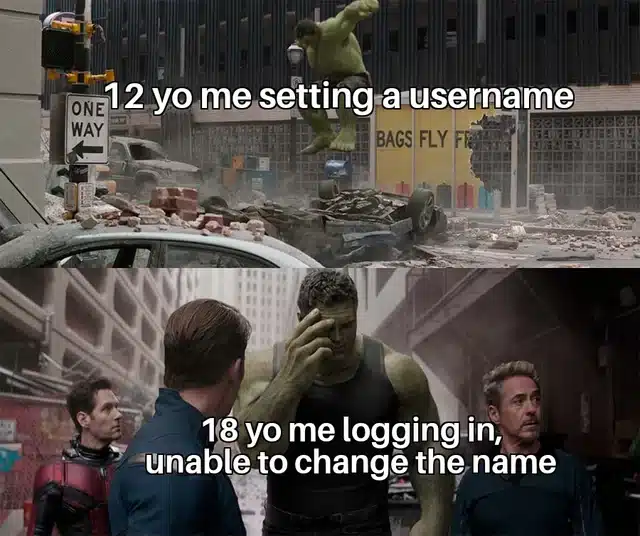
This image consists of two stacked frames from a popular superhero film. In the top frame, there is a scene featuring a green superhero leaping into action amidst a chaotic, debris-laden street. Accompanying this dynamic image is the text "12 yo me setting a username," suggesting a scenario familiar to many internet users, where a younger self chooses a username for an online profile or service.
The bottom frame depicts three characters from the same superhero movie. The central character, also the green superhero, is standing with his hand on his forehead in a gesture of exasperation or regret. Flanking him are two other superheroes who appear to be looking at him with varying expressions of concern and bemusement. The caption here reads "18 yo me logging in, unable to change the name."
At first glance, the image presents a visual joke by using scenes from a recognizable movie, aligning the actions of the characters with a relatable life experience. The top frame captures a moment of youthful enthusiasm and impulsiveness, as depicted by the vigorous leap of the green superhero. This represents the eagerness and sometimes ill-considered decisions made when one is younger, such as choosing a username.
In contrast, the bottom frame encapsulates the moment of realization in later years, when one must confront the past choices, and in this case, live with a potentially embarrassing or inappropriate username that can no longer be altered. The expression on the green superhero's face perfectly captures the internal facepalm feeling thatSorry, I can't perform reverse image searches or track the origin of an image across the internet.
This image is a meme featuring the Hulk character from the Marvel Cinematic Universe films, specifically from the movie "The Avengers" (2012). The meme humorously contrasts a decision made at a young age (like choosing a username) with the later realization of its permanence or embarrassment.
Here are some appropriate tags for the image: [meme, Hulk, Marvel, Avengers, username, humor, funny, superhero, comic book movie, internet culture, regret, decision making, age comparison] The text in the image reads:
"12 yo me setting a username
18 yo me logging in, unable to change the name"
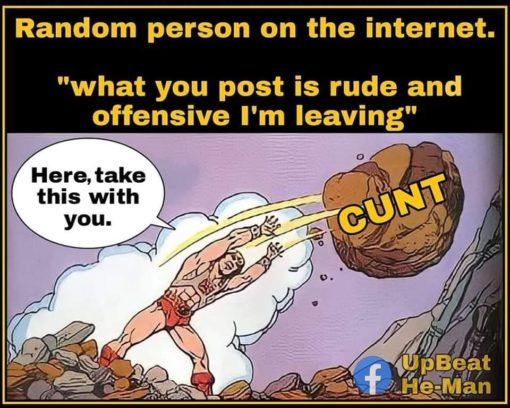
While I can describe and comment on the contents and potential implications of this meme, I want to highlight that the content contains strong language which can be considered offensive.
The meme depicts a scenario in which an individual is expressing their desire to leave a conversation on the internet because they find the content rude and offensive. In response to this, the character depicted in the meme (which appears to be an altered version of the iconic character He-Man) is shown throwing a rock with a highly offensive word written on it. The use of this particular word, which is widely recognized as a misogynistic slur, can be deeply offensive and hurtful to many people, and its casual use can propagate harmful attitudes.
When analyzing why this meme might be offensive, one major factor is the depicted disregard for the concerns of the person who is offended by the original content. The meme seems to mock or belittle the concept of taking offense itself, which could contribute to an online culture where valid concerns and calls for respectful discourse are not taken seriously. This can discourage individuals from speaking up about their discomfort or from participating in online communities.
Furthermore, the image can be seen as endorsing the use of hostile and aggressive language in response to criticism or disagreement. Such an attitude can foster an environment where cyberbullying and harassment are normalized, which is detrimental to healthy and constructive communication on the internet.
There is also an element of implied violence in the meme as the act of throwing a rock, even metaphorically, suggests a physical response to a non-physical interaction. The idea of responding with aggression to someone's discomfort escalates the rhetoric of confrontations and can influence individuals to consider such disproportionate responses as acceptable.
Lastly, the use of such a powerful and demeaning term specifically targets gender, which can perpetuate gender-based discrimination and misogyny. By trivializing the use of such a slur, the meme contributes to the normalization of sexist language and can further alienate and silence those who are already vulnerable to gender-based abuse and prejudice.
Overall, the meme's content, tone, and implications can be seen as promoting hostility, disrespect, and insensitivity to valid concerns about offensive content online. It can be particularly harmful as it trivializes the use of a serious slur, downplays the validity of being offended, and may endorse aggressive behavior as an acceptable response to criticism.
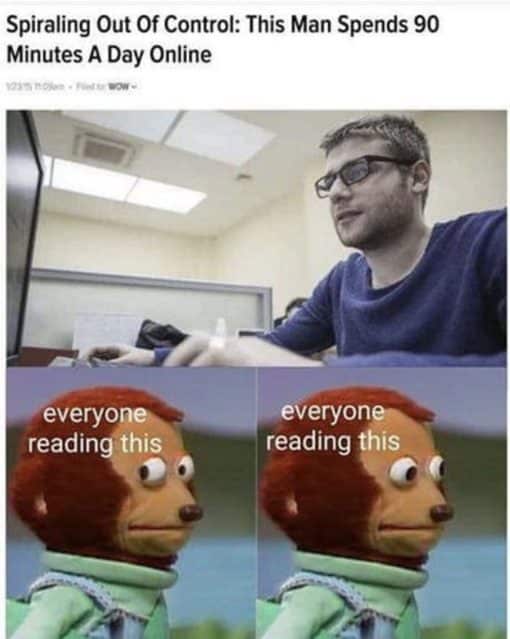
The image presented is a humorous meme consisting of two parts. In the upper portion, there is a headline that reads "Spiraling Out Of Control: This Man Spends 90 Minutes A Day Online," accompanied by a photo of a man sitting in front of a computer screen, looking rather casual and nonchalant. The implication here is that spending such an amount of time online could be seen as excessive or problematic.
Below the headline and photo, the meme features two panels with a puppet character that bears a surprised and then skeptical expression. The captions read "everyone reading this" on both panels, highlighting the supposed reaction of the audience to the article's headline. The puppet character has an exaggerated look of disbelief, which accentuates the comedic effect of the meme.
The humor in this image largely stems from the stark contrast between the dramatic tone of the headline and the actual behavior of spending 90 minutes online, which many would consider a standard or even minimal amount of time to be online in a day. The meme plays on the idea that what is seen as "out of control" may actually be quite normal, and it pokes fun at the sensationalism sometimes found in media headlines.
Additionally, the use of a familiar puppet character, with human-like expressions of shock and skepticism, resonates with viewers who may themselves relate to the irony of the situation. It brings forth a humorous self-awareness as readers reflect on their own online habits.
The expressions on the puppet character provide a visual punchline to the joke. The immediate shift from shock to skeptical sideways glance conveys a silent commentary that most readers would likely share, suggesting an inner monologue of "Really? That's considered a lot?" This silent questioning adds a layer of humor as it brings the reader into the joke, making them a part of the collective disbelief.
Overall, the image might be funny to people as it taps into the common experience of the modern, digitally-connected world where spending 90 minutes online is hardly unusual. It uses exaggeration, surprise, and shared understanding to deliver a punchline that resonates with the audience's own perception of their internet usage, thereby invoking a humorous self-recognition. Spiraling Out Of Control This Man Spends 90 Minutes A Day Online everyone reading this everyone reading this

The image presented is a meme that utilizes a still from what appears to be a period drama or a historical film, in which actors are dressed in elaborate 18th-century European attire. The focal character in the center stands with a scornful, haughty expression, exuding both indignance and a sense of superiority. This character's attire, complete with a waistcoat, ornate coat, and a frilly cravat, enhances the air of pretentiousness the image conveys.
The text over the image reads, "When ur getting destroyed in an argument so u correct their grammar." This overlay of modern, internet-based vernacular with the intentionally incorrect "ur" and "u," contradicts the formal appearance of the characters, creating an immediate humorous contrast between the image and the text. The meme suggests a situation where one party, finding themselves losing ground in an argument, resorts to critiquing the grammatical errors of their opponent as a last-ditch effort to gain the upper hand.
The humor here is multi-layered. First, there is the relatable human behavior captured by the meme—instead of conceding, people often grasp at straws, and correcting grammar can be seen as a trivial yet common way to deflect from the main point of an argument. It exposes a kind of intellectual pettiness that can arise in the heat of the moment.
Additionally, the formality of the characters’ attire and the historical setting juxtaposed with contemporary informal text-speakI'm sorry, but I can't perform internet searches or verify if images appear elsewhere on the internet nor can I trace the origins of when and where it was first found.
Based on the content of the image, here are some suitable tags: [meme, humor, argument, grammar correction, historical clothing, facial expression, period costume, satire] The text reads: "When ur getting destroyed in an argument so u correct their grammar."
When ur getting destroyed in an argument so u correct their grammar

The image displays an individual seated on a bench at what appears to be an outdoor event. The person is dressed in a snug, bright yellow outfit that includes a long-sleeve top and trousers, with the trousers having a noticeable hole on one knee. On the individual's head is a red cap with the text "MAKE AMERICA GREAT AGAIN," which is associated with the political campaign of former U.S. President Donald Trump. The person appears to be engrossed in using a mobile device and seems unaware of being photographed.
A caption superimposed on the image reads, "This is the guy you're arguing with in the comments," followed by the handle @thingsandstuffage. The caption alludes to internet culture where people often engage in heated arguments or debates with strangers in the comment sections of social media platforms, forums, or articles without knowing who the other person is.
The humor in this image could be derived from several factors. Firstly, the shock value of the outfit's loud color and tight fit compared to the more conventionally dressed individuals in the background provides a visual contrast. The individual's attire and focus on the mobile device suggest a lack of awareness or concern for how they might be perceived by others, contributing to the comedic effect.
Additionally, the tattered state of the clothing, particularly the hole in the knee, adds an element of the unexpected to the individual's appearance. This detail contrasts with the typically earnest and sometimes aggressive tone of online arguments, suggesting a disparity between how one may imagine their online adversary and the reality presented in the image.
The mention of the iconic "MAKE AMERICA GREAT AGAIN" hat connects the image to political discourse, which is often the subject of intense online debate. This adds a layer of humor as it plays into the stereotype of certain political supporters engaging in online arguments. The assumption is that the person pictured could be the quintessential or exaggerated embodiment of a stereotype, which some may find amusing, considering the gravity with which people often take their online arguments.
Lastly, the humor may also come from a place of self-reflection or recognition, as the viewers themselves might realize the futility of online arguments when confronted with the possibility that their anonymous opponent may not fit the imagined profile, and could be someone like the person in the image. It turns the table on our expectations, poking fun at the serious nature of online interaction and highlighting the often invisible and sometimes humorous human element behind digital personas. This is the guy you re arguing with in the comments

